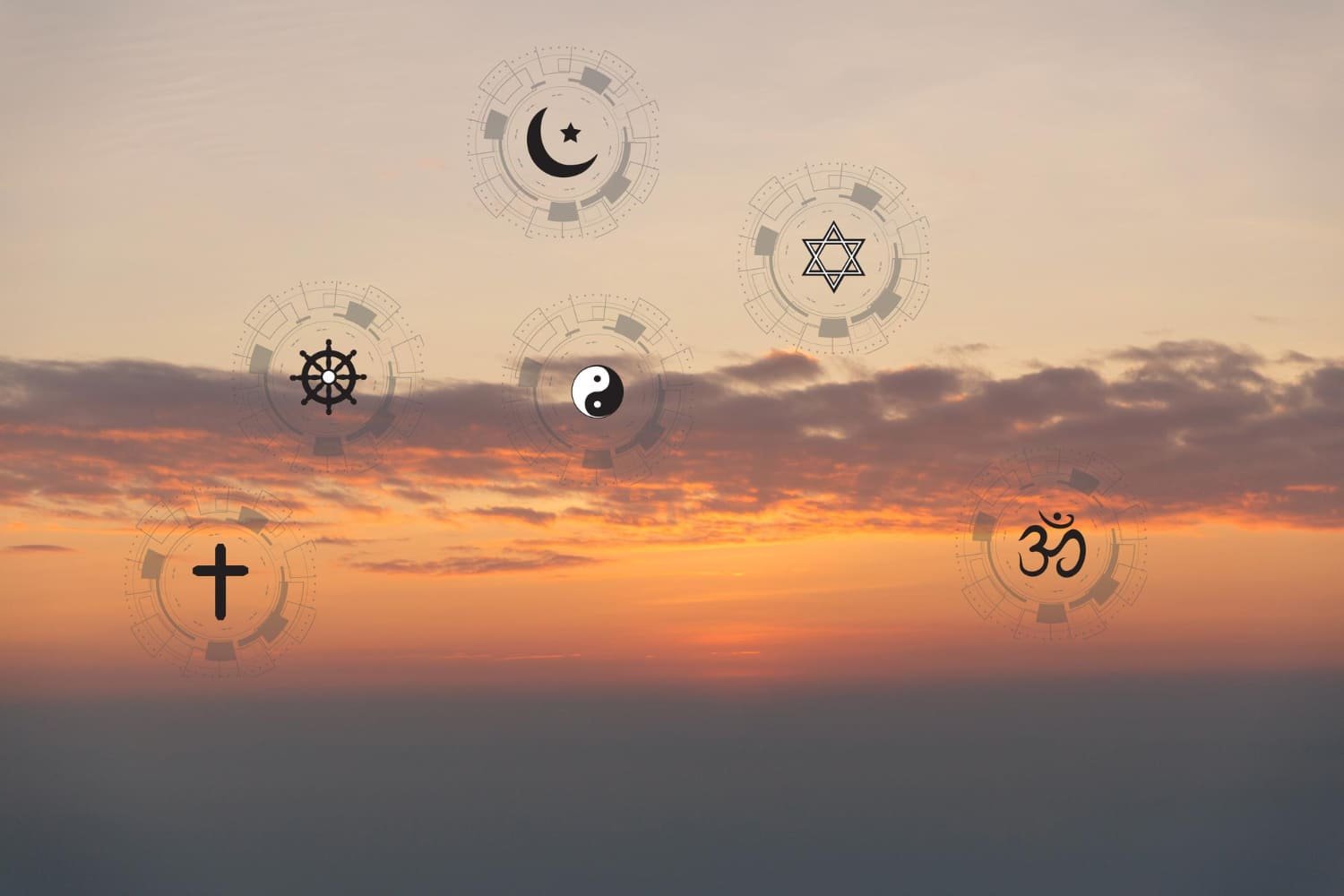Buddhism and Islam are two of the world’s largest religions, each with millions of followers around the globe. While both religions have some similarities, they also have some significant differences that set them apart from one another.
One of the most significant differences between these two religions is the concept of a higher power. Islam is a monotheistic religion, which means that its followers believe in one God, Allah. In contrast, Buddhism is a nontheistic religion that does not recognize a single deity or creator.
Instead, Buddhists believe in the concept of enlightenment, which involves achieving a state of inner peace and understanding through meditation and other practices.
Another difference between Buddhism and Islam is their approach to the afterlife. In Islam, followers believe in a Judgment Day when they will be judged based on their deeds and either rewarded with eternal paradise or punished with eternal damnation.
In contrast, Buddhists believe in the concept of reincarnation, which involves the rebirth of the soul into a new body after death.
The ultimate goal of Buddhism is to achieve enlightenment and break the cycle of reincarnation, whereas in Islam, the goal is to live a righteous life and be rewarded in the afterlife.
Origins and History of Buddhism and Islam
Buddhism and Islam are two of the world’s major religions, each with its own unique history and origins. Buddhism was founded by Siddhartha Gautama, who was born in present-day Nepal around 563 BCE. He was a prince who gave up his luxurious life to seek enlightenment and find the cause of human suffering.
After years of meditation and self-reflection, he achieved enlightenment and became known as the Buddha, or the “enlightened one.”
Islam, on the other hand, was founded by the Prophet Muhammad in the Arabian Peninsula in the 7th century CE. Muhammad was a merchant who received revelations from Allah through the angel Gabriel. These revelations were eventually compiled into the holy book of Islam, the Quran.
Buddhism spread throughout Asia, first through the efforts of the emperor Ashoka in India, and later through the work of Buddhist missionaries such as Bodhidharma, who brought Buddhism to China.
Over time, Buddhism split into different schools and traditions, including Theravada, Mahayana, and Vajrayana.
Islam also spread rapidly, first throughout the Arabian Peninsula and then throughout the Middle East, Africa, and Asia. The Islamic empire, known as the Caliphate, was one of the largest and most powerful empires in history, and played a major role in the development of science, art, and culture.
Both Buddhism and Islam have had a profound impact on the world, shaping the beliefs and practices of millions of people.
While they have many differences, including their beliefs about God, the afterlife, and the nature of existence, they also share some similarities, such as their emphasis on compassion, self-discipline, and the pursuit of spiritual growth.
Beliefs and Practices of Buddhism and Islam
Buddhism and Islam are two very different religions with distinct beliefs and practices. While Buddhism is a nontheistic religion that does not believe in a creator God, Islam is a monotheistic religion that believes in worshiping an almighty God.
The two religions also have different beliefs about the afterlife, with Buddhism teaching reincarnation and Islam teaching about heaven and hell.
Buddhism emphasizes the Four Noble Truths and the Eightfold Path, which are the core teachings of the religion. The Four Noble Truths state that suffering exists, suffering arises from craving, suffering can be overcome, and the way to overcome suffering is through the Eightfold Path.
The Eightfold Path consists of right understanding, right intention, right speech, right action, right livelihood, right effort, right mindfulness, and right concentration. The goal of Buddhism is to achieve enlightenment and end the cycle of rebirth.
Islam, on the other hand, emphasizes the Five Pillars of Islam, which are the foundation of the religion. The Five Pillars consist of the declaration of faith, prayer, charity, fasting during the month of Ramadan, and pilgrimage to Mecca.
Muslims believe in the oneness of God and that Muhammad is his prophet. The goal of Islam is to submit to the will of God and attain paradise in the afterlife.
Both religions have practices that are important to their followers. Buddhists practice meditation, which is a way to cultivate mindfulness and achieve enlightenment. They also follow the Five Precepts, which are guidelines for ethical behavior.
Muslims pray five times a day, facing Mecca, and recite verses from the Quran. They also give to charity, fast during Ramadan, and perform the hajj, or pilgrimage to Mecca, at least once in their lifetime if they are able to do so.
| Buddhism | Islam |
|---|---|
| Nontheistic religion | Monotheistic religion |
| Believes in reincarnation | Believes in heaven and hell |
| Emphasizes Four Noble Truths and Eightfold Path | Emphasizes Five Pillars of Islam |
| Practices meditation and follows Five Precepts | Prays five times a day, gives to charity, fasts during Ramadan, and performs hajj |
Comparison of Buddhism and Islam
Buddhism and Islam are two of the world’s major religions, with a combined following of over 1.5 billion people. While they share some similarities, they also have fundamental differences in their beliefs, practices, and values.
One of the key differences between Buddhism and Islam is their view of God. Islam is a monotheistic religion that believes in the worship of an almighty God, while Buddhism rejects the notion of a creator God. Instead, Buddhists honor enlightened beings as deities.
Another significant difference is their approach to the afterlife. In Islam, a person’s goal is to live on, and they hope for a positive judgment from God when they die, leading to entrance into eternal paradise.
In contrast, Buddhists aim to halt the cycle of life and death and achieve enlightenment, which means transcending the physical world and attaining a state of peace and bliss.
The two religions also have different beliefs about moral conduct. While both religions emphasize the importance of good deeds and avoiding harmful actions, Buddhism preaches vegetarianism and shunning alcohol and drugs. In contrast, Islam bans alcohol but does not preach vegetarianism.
Another significant difference is their approach to religious texts. Islam has the Quran as its central religious text, which Muslims believe to be the word of God as revealed to the Prophet Muhammad.
In contrast, Buddhism has a vast collection of scriptures, including the Tripitaka, which contains the teachings of the Buddha, and the Mahayana Sutras, which are considered to be the words of the Buddha.
Overall, while there are similarities between Buddhism and Islam, they have significant differences in their beliefs, practices, and values. It is up to each individual to decide which religion resonates with them the most.
Controversies and Misconceptions about Buddhism and Islam
Like any religion, Buddhism and Islam have faced controversies and misconceptions over the years. One common misconception about Buddhism is that it is a religion of non-violence and pacifism. While it is true that Buddhism preaches non-violence and compassion, there have been instances of violence committed by Buddhists throughout history, particularly in the context of ethnic and political conflicts.
For example, in Myanmar, there have been reports of Buddhist monks participating in violent attacks against Muslim minorities.
Similarly, Islam has faced controversies and misconceptions, particularly in the context of terrorism and extremism. There is a common misconception that Islam promotes violence and terrorism, and that all Muslims are terrorists. However, this is far from the truth.
While there have been instances of terrorism committed by individuals and groups claiming to act in the name of Islam, the vast majority of Muslims are peaceful and reject violence.
Another controversy related to Islam is the treatment of women. There is a common misconception that Islam is oppressive towards women and promotes gender inequality. However, this is not entirely true. While there are certain cultural practices that are wrongly attributed to Islam, such as female genital mutilation and forced marriages, Islam itself promotes gender equality and women’s rights.
The Quran explicitly states that men and women are equal in the eyes of God, and women have the right to education, work, and inheritance.
Similarly, there are misconceptions about Buddhism’s treatment of women. While Buddhism does not promote gender inequality, there have been instances of discrimination against women within Buddhist institutions.
For example, in some Buddhist traditions, women are not allowed to become ordained as monks, and are relegated to a lower status within the hierarchy.
Overall, it is important to recognize that both Buddhism and Islam are complex and multifaceted religions, and it is unfair to make sweeping generalizations or judgments based on misconceptions and controversies.
Which One is Better?
When it comes to comparing Buddhism and Islam, it is important to note that both religions have their own unique set of beliefs, practices, and values. It is not appropriate to say that one is better than the other as it is subjective and depends on individual perspectives and experiences.
Buddhism focuses on the teachings of the Buddha which emphasize the importance of mindfulness, compassion, and the pursuit of enlightenment. It promotes a way of life that is centered around inner peace and self-improvement.
On the other hand, Islam is a monotheistic religion that emphasizes the worship of Allah and the adherence to the teachings of the Prophet Muhammad. It promotes a way of life that is centered around the worship of Allah and the pursuit of righteousness.
Both religions have their own strengths and weaknesses. Buddhism provides a framework for personal growth and development, while Islam provides a framework for social and community-oriented growth and development. Ultimately, which one is better depends on what an individual is looking for in a religion.
It is important to note that both religions have contributed significantly to human history and have had a profound impact on the world. They have both inspired countless individuals to lead lives of purpose and meaning, and have provided a source of comfort and guidance to millions of people around the world.
Therefore, it is not appropriate to say that one religion is better than the other. It is important to respect and appreciate the differences between the two religions and to recognize the value that each one brings to the world.







